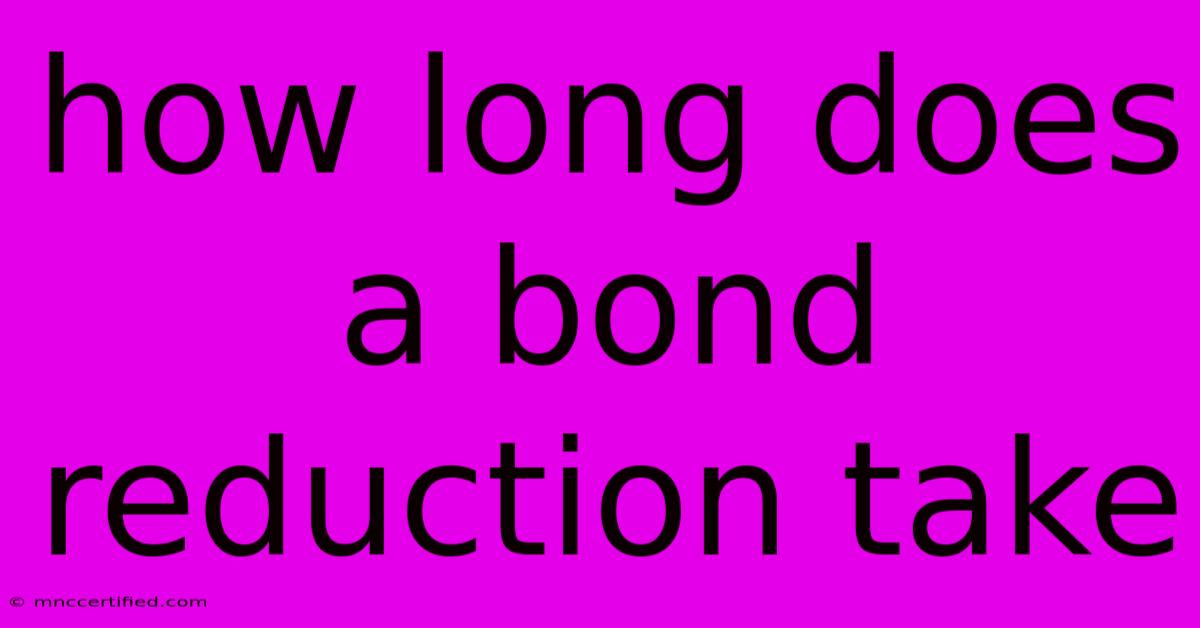How Long Does A Bond Reduction Take

Table of Contents
How Long Does a Bond Reduction Take? A Guide to Understanding the Process
Being released from jail on bond is a relief, but the process can be long and complex. Sometimes, the original bond amount might be too high, causing financial strain or preventing release. This is where a bond reduction comes in.
But how long does it take to get a bond reduction? The answer isn't straightforward and depends on various factors. Let's delve into the details.
What is a Bond Reduction?
A bond reduction occurs when a judge lowers the original bail amount set for a defendant. This can happen for several reasons:
- Financial hardship: The defendant or their family cannot afford the original bond amount.
- Low flight risk: The judge determines that the defendant is unlikely to flee before trial.
- Weak evidence: The prosecution's case against the defendant appears weak.
Factors Influencing the Timeframe
The time it takes for a bond reduction can vary significantly, influenced by:
- Jurisdiction: Different courts have different procedures and timelines.
- Complexity of the case: Complex cases involving multiple charges or witnesses can take longer.
- Judge's discretion: The judge ultimately decides whether to reduce the bond and how much to lower it.
- Defendant's history: A defendant's criminal record can impact the judge's decision.
- Evidence presented: The strength of the evidence presented in favor of bond reduction can influence the judge's decision.
Stages of the Bond Reduction Process
- Filing a Motion: The first step is filing a formal motion with the court requesting a bond reduction. This motion should clearly state the reasons for the reduction and include supporting documentation.
- Hearing: The court will schedule a hearing to review the motion and hear arguments from both the defense and prosecution.
- Judge's Decision: After considering all the arguments and evidence, the judge will decide whether to grant the bond reduction. If approved, the bond amount will be lowered.
- Posting the Bond: The defendant needs to post the new bond amount to be released.
Tips to Expedite the Process
- Consult with an attorney: A qualified criminal defense attorney can guide you through the process, present strong arguments, and help expedite the bond reduction.
- Gather supporting documentation: Provide the court with any relevant documents, such as financial statements, medical records, or character references, to strengthen your case.
- Attend all court hearings: Be present at all hearings to ensure your voice is heard and to demonstrate your commitment to the process.
Conclusion
While there's no definitive timeline for bond reduction, understanding the factors involved can help you navigate the process. Remember to consult with an attorney and gather supporting evidence to increase your chances of a successful outcome. It's crucial to stay informed and proactive throughout this process to ensure a fair and efficient resolution.

Thank you for visiting our website wich cover about How Long Does A Bond Reduction Take. We hope the information provided has been useful to you. Feel free to contact us if you have any questions or need further assistance. See you next time and dont miss to bookmark.
Featured Posts
-
Trump Nominates Stefanik For U N Ambassador
Nov 12, 2024
-
Tesla Stock Rise Reasons Explained
Nov 12, 2024
-
Camilla On King Charles In New Documentary
Nov 12, 2024
-
Kaur Apologizes For Kate Smoking Speculation
Nov 12, 2024
-
Catalan Federation Award Goes To Barcelona Handball
Nov 12, 2024